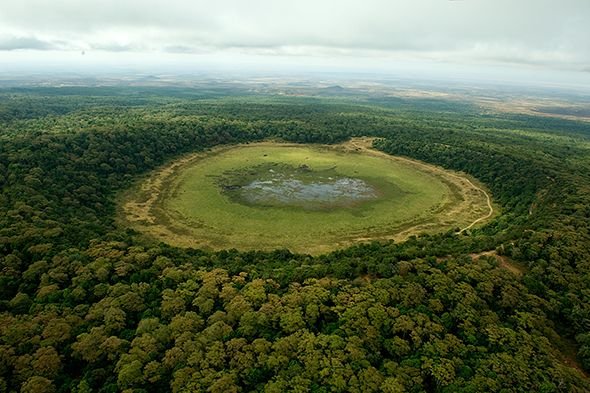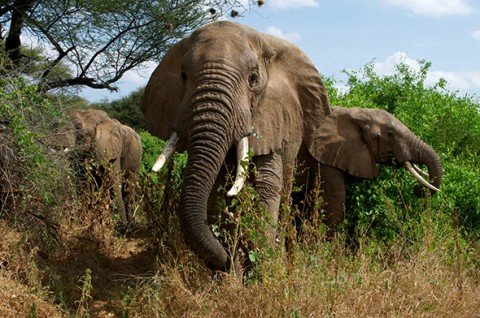
Aerial view of Lake Paradise in Marsabit National Park (Photograph by Pete McBride)
For a recent birthday, writer David Lansing received an unusual gift from a friend–a well-worn book with the great title I Married Adventure, purchased at auction because his acquaintance like the book’s cover: a zebra-stripe pattern.
The memoir, published in 1940, sat untouched on Lansing’s shelf for months until one afternoon, bored, he began reading the brittle jaundiced pages. The prose was showy, histrionic–like an old Frank Capra movie–yet absorbed him completely. Particularly when he got to the part where the author, Osa Johnson, and her husband, Martin, both natives of Kansas, took off for faraway East Africa in 1921 determined to document on film a land they know almost nothing about.
What, Lansing wondered, where they thinking? And what did they find?
Following up on an insider tip, the couple set out, led by big-name game hunter Bud Cottar, across the Kaisut Desert in search of a lake “nobody knows about.” Eventually they came upon a small body of water in the shape of a spoon that sloped up into steep, wooded banks 200 feet high, which they dubbed Lake Paradise. Nearly a century later, Lansing returned to the wilds of northern Kenya along with photographer Pete McBride to see if the lake was still there–guided by Cottar’s great-nephew Calvin Cottar.

In Lansing’s words:
I immediately researched the name, but in this age of information there was almost nothing to be discovered about this lake since the Johnsons’ explorations. I found a few undated photos, notices of discontinued safari trips, warnings about difficult travel. It appeared that Paradise Lake–once a Garden of Eden in the middle of a hostile desert–had in ensuing years vanished.
How was this possible? Did Lake Paradise still exist? And if so, what had happened to the herds of elephants the Johnsons had filmed and the ancient cloud forest that was home to great numbers of leopards, baboons, and African buffalo?
I had wanted, and now I felt compelled, to find out.
What Lansing and McBride discovered on assignment for Traveler in the wilds of northern Kenya almost a hundred years after the Johnsons traveled there: Life here remains remarkably the same–and wildlife is flourishing thanks to smart conservation efforts.
Hi! I am a robot. I just upvoted you! I found similar content that readers might be interested in:
http://intelligenttravel.nationalgeographic.com/2014/01/29/insiders-guide-to-northern-kenya/